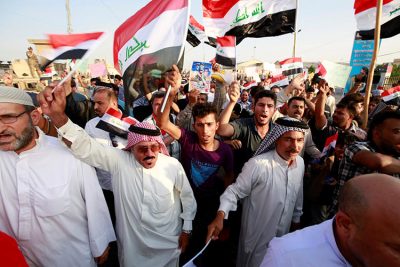Iraqi Protestors: They Demand Basic Services and an End to Corruption

Nearly 300 protestors in Iraq have been killed, and 9,800 wounded since protests began on October 1. Security forces have cracked down on protestors while using live ammunition, rubber bullets, and tear gas. The protests have been held in various locations across the country, but have been absent in the North. The protestors are demanding an end to systematic government corruption which will need a rewrite of the constitution and new leadership, including a new parliament. Iraq has the world’s second-largest reserves of crude oil, while the protestors have complained of poverty conditions, and lack of basic public services.
Grand Ayatollah Ali al-Sistani, is a cleric in Shia-majority Iraq. His representative said in a sermon after Friday prayers in the holy city of Karbala,
“The biggest responsibility is on the security forces. They must avoid using excessive force with peaceful protesters.”
Iraqi Prime Minister Adel Abdul Mahdi presented a reform plan to address the demands of protesters, but he cautioned that change takes time and has offered to resign. President Barham Salih offered to hold new elections, but these leaders may not be in touch with the demands of the people: they want the old governmental system to be dismantled and a new system put in its place, which prevents political parties, their winning candidates, the civil servant department heads, and their sectarian armed militias from draining the country’s wealth.
A banner in downtown Baghdad read:
“To the whole world, to the United Nations, to the European Union, to the Security Council, to the Arab League: They stole my country and killed our young men and destroyed our Iraq.”
In March 2003 the US attacked and invaded Iraq. The only reason was for regime change, to remove a Sunni secular leader, and replace him with a Shite leader who was supposed to represent the majority of the 35 million population.
Saddam Hussein had been a very vocal critic of ‘Israel’ and had threatened them. Most experts agree that the US foreign policy on the Middle East is written in Tel Aviv, and a document named “A Clean Break” commissioned by Benjamin Netanyahu in 1996, and written by Richard T. Perle, found its way onto the desk of Pres. George W. Bush. The plans to invade Iraq went into action with Richard T. Perle as Chairman of the Defense Policy Board. In the first 3 years of the war, 655,000 Iraqis had been killed. The US destroyed a country that had been run by a violent and abusive dictator, and the country never recovered.
Iraq never became a prosperous country, with democratic leaders, and public services accessible to all. After the US rape of the country, they imposed a constitution and system of government doomed to fail and which would promote sectarian hatred and which has kept the country in poverty and hopelessness, and the recent protests are the direct result of the war 16 years ago.
The chaos produced from “Desert Storm” and the subsequent 2003 US invasion, regional countries, including the US, have entered Iraq for their benefit, both political and economical. Saudi Arabia, Iran, and the US have been throwing fuel on the fire in Iraq. The US and Saudi Arabia are allied on one side, pitted against Iran on the other, as they pull in opposite directions in a ‘tug-of-war’. Iran utilizes Iraq as a path for their Tehran-Baghdad-Damascus highway, which supports the resistance movement. The Saudi-US alliance wants to prevent the support of the resistance movement.
The corrupt Iraqi government system is the cause of the mass protests, and until the governing elite reform the system the country will continue to be in chaos. The protestors do not blame individual politicians for being greedy and corrupt. This issue is systematic and not the classical scenario of the corrupt politician who is filling his pockets with money siphoned off from bribes and favors. No, this is a broad systematic flaw, which affects every sect and every party, and is made possible by a defective constitution and a faulty parliament. This is politically sanctioned corruption which goes far beyond the President, Prime Minister and Speaker of the Parliament.
This goes all the way down to the civil servants and party bosses. When each new government is elected, the winning parties sit down and divide the ‘cake’ among themselves, and all the various sects participate. Iraq is very sectarian, but regardless of which sect you look at, they all participate in the ‘dividing the spoils of war’ mentality. The sectarian system is underpinned by an agreement among the political parties that the presidency is reserved for Kurds, the premiership for Shia Arabs, and the post of speaker of parliament for Sunni Arabs. The US is among the most secular, free and democratic nations on earth, and yet left Iraq destroyed, and without any semblance of democracy, which they profess to have delivered to Iraq on the back of the bombs.
*
Note to readers: please click the share buttons above or below. Forward this article to your email lists. Crosspost on your blog site, internet forums. etc.
This article was originally published on Mideast Discourse.
Steven Sahiounie is a political commentator. He is a frequent contributor to Global Research.

